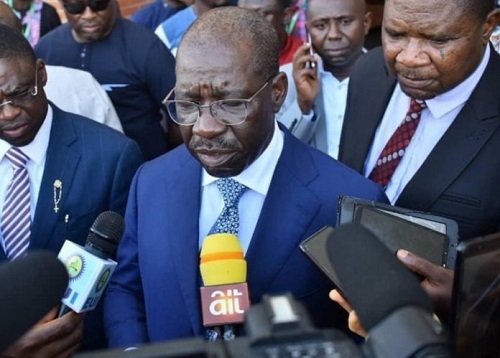This post has already been read 1607 times!
Gov. Godwin Obaseki of Edo, says the focus of his administration is to attract investors into the oil palm and cassava sub-sectors for the manufacturing of Consumer Packaged Goods (CPG).
Obaseki stated this during a virtual meeting with U.S. Ambassador to Nigeria, Mary Beth Leonard, and some foreign and local agribusiness investors in Abuja.
Also in attendance included the U.S. Consul General, Claire Pierangelo, U.S. Embassy Economic Officer, Richard Michaels, and U.S. Embassy Political Officer, Brandon Hudspeth.
The meeting was held as part of the activities marking the inauguration of the new U.S. President, Joe Biden, and Vice-President, Kamala Harris.
Obaseki said that in his first term in office, efforts were made to shift to getting the job done by instituting the framework for Edo State Oil Palm Programme (ESOPP)
According to the governor, this is in support of oil palm value chain development in the state for the benefit of all. “At the sub-national tier of government, we focus on moving from lamenting to executing; we are focused on getting the job done.
“This paradigm shift in the establishment of the ESOPP will now include a move toward a renewed focus on Cassava Industrialisation Programme through our land administration and civil service reforms.
“We want to build the capacity of our people to attract private investments in agro-industrialisation,” he said
Obaseki expressed delight in the support and commitment of the ambassador to the plight of farmers and value chain development in the state.
He commended the U.S. continued support for Fayus Inc., an agro-processor and distributor based in Sacramento, California, for its investments in Edo and Nigeria.
The governor pledged an additional allocation of 5000 hectares of land for the firm, while emphasising the need for human capacity development to engage the people of Edo.
Amb. Leonard, who led the team of U.S. officials, commended Obaseki for his expression of interest to attract U.S. agri-business investors in the cassava and oil palm value chains.
The ambassador pledged support to incentivize other U.S. food and agribusiness companies to invest in Africa.
“Fayus Inc.’s $43.7 million investment commitment in cassava new food products development serves as an example of synergy of goals in value creation to drive food security and economic diversification.
“It also encourages jobs creation under the Prosper Africa Initiative and DFC project financing in support of US-Africa investors,” the ambassador said.
Leonard also thanked Fayus Inc., AfricaGlobal Schaffer (AfGS), ShineBridge Global (SBG) and local partners in Nigeria for investing in the country.
In his remarks, the Chairman of Fayus, Inc., Mr Fatai Yusufu, expressed readiness to transform oil palm and cassava value chains in the state.
“We are ready to get the job done in Nigeria and in Edo.
“Over the next four years, we will be milling palm oil in Edo from our investment in the 5,000 hectares of land recently allocated by Gov. Obaseki’s administration.
“Fayus, Inc. is one of six new oil palm investors in Edo with state-of-the-art nurseries boasting of over 600,000 high-performance seedlings ready for planting in 2021.
“Fayus, Inc. is committed to sustainable cassava supply chain infrastructure development and value creation in Nigeria,” he said.
Yusufu said this is to meet the company’s latent demand of 50,000 tonnes of High-Quality Cassava Flour (HQCF) for in-country manufacturing of CPG in Nigeria and export to North American, European, and Australian markets.
He said the investors were committed to invest $43.7 million in industrial food ingredients and CPG cassava value creation, food science and technology knowledge transfer as well as increased trade and investment inflows between the United States, Nigeria and other ECOWAS countries.
According to him. Fayus Inc. plans to invest over $32 million in cassava value creation in Nigeria and an additional $18 million in Ghana and Togo, and has approached the USAID funded West Africa Trade and Investment Hub (WATIH) for support.
Also, the Chairman of Shine Bridge Global Inc., Dr Tony Bello, said that the market size of gluten-free and grain-free CPG is estimated at $4.5 Billion by 2025.
Bello said that value-added HQCF or tapioca flour serves as functional food ingredients for making ready-to-eat consumer new food products.
The News Agency of Nigeria (NAN) reports that Fayus Inc. is the manufacturer of the famous ‘Ola Ola’ brand of ‘Poundo yam flour’ and is expanding the brand to include Cassava Flour Mixes for making baked goods such as crackers and pizza crusts, snacks, shawarma, noodles, and others.
Also, Dr Mima Nedelcovych, the Chairman of AfricaGlobal Schaffer (AfGS), an agro-industrial company operating in Africa, appreciated Obaseki for the opportunity to invest in the state.
He said that the time of lamentation was over and it was time to get the job done by leveraging on U.S. Departments and Agencies such as USAID, USTDA and the United States International Development Finance Corporation (DFC).
Nedelcovych stressed on the need to take advantage of the U.S. Exim Bank, African Export-Import Bank (AfreximBank) and the African Development Bank (AfDB) alongside the Central Bank of Nigeria (CBN) for food and agricultural industrialisation.
He said that the aim was to rapidly reach 15 states of the federation on large scale commercial cassava production, HQCF processing and CPG manufacturing with planned investments of $250 million up to $500 million.
Nedelcovych, who is also a co-facilitator of the meeting, thanked all the participants and Obaseki’s Special Adviser on Agriculture and Food Sustainability, Prince Joe Okojie, for working behind the scene to develop the state.
Other participants included Pacific Ring West Africa, Elephant Group Plc., and Von Foods Limited.



